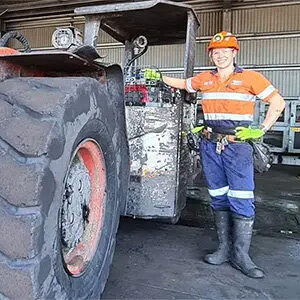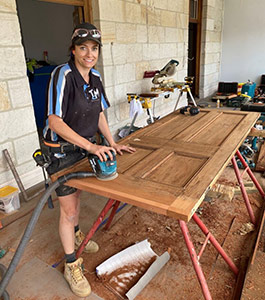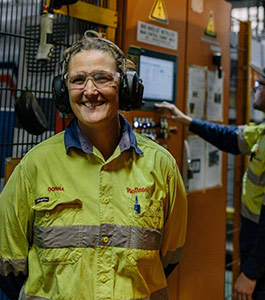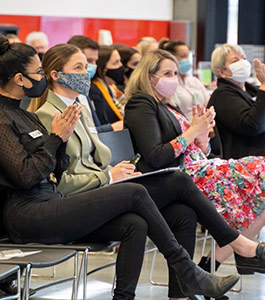On a relaxed Friday afternoon, TWA’s Erika Williams hosted an event focusing on three female Trailblazers who shared their stories, knowledge and experience with the audience. The energy, positivity and openness of the panel was infectious – the audience were engaged through the kinship built in the session.
If you missed out on the session, or want to relive it, the following notes were taken down on the day. We hope you are encouraged, supported and enthused through these pearls of wisdom:
Meet the Panel
Jo Devenish– Jo started out in waitressing, left Canberra at 19, and had dreams of becoming a musician. Five years later she became an A grade technician. From there she travelled the world, returned to Karratha to work, and then she and her partner moved to Melbourne to start a family. She started her own business and also became a trades teacher at NECA. Jo then retrained to become the first female tunnel boring operator in Australia.
Amanda Woods – A self-confessed woodworking and furniture-making nerd, Amanda is passionate about teaching trades. She is currently a teacher at Holmesglen TAFE, training others in cabinetmaking and joinery. She is also the dedicated founder of Women in Trades network in Victoria. Amanda started her career in cabinetmaking, developed carpal tunnel syndrome, so turned to teaching.
Robyn Gray – Robyn comes from the school of “don’t tell me what I can’t do, tell me what I can, and I’ll do it myself”. She completed a law degree at Monash in the 1970’s. She then went on to complete a fine arts/teaching degree, then went on to become a metalwork and woodwork teacher, careers counsellor and single mother. She has qualifications in careers advice and counselling, has worked across schools, TAFEs and Universities, and has helped thousands of people in finding what they want to do – particularly females wanting to start a trade.
Q: They say you can’t be what you can’t see. Without female role models around you, how did you carve your way around a male dominated environment and find your own path?
Jo – I definitely stood out on my own as a woman, but I was driven to prove everyone wrong!
Amanda – there’s immense pressure to become one of the boys and not to stand out if you are in trades. On the other hand you’re also not encouraged to pursue trades at all, but I believe this is changing. Dad was a huge support in pursuing a trade! He gave me his shed and his tools – my family even bought me a circular saw for my 14th birthday.
Robyn – I’m one of three children, and would always compete with my brothers to show I could do it too. I played cricket and footy, played with my brothers and other kids in our street – Dad told me I was the best kick in the street. I also had an encouraging father, who had seen women accomplish many things during wartime, so encouraged me to do what I wanted. Dad would lend me his tools, allow me to use grandfather’s tools, and my male relatives also let me borrow tools. Mum wanted me to go to uni, and was thrilled when I did, but was always really supportive.
Q: Jo – what’s the biggest challenge day to day? And how do you juggle being a Mum of 3 with 12 hour shifts?
Honestly the biggest challenge is to get out of bed the times I have to get up! But seriously, it’s definitely gender bias. You really feel it at the start of a job – it’s tough. You get the vibe that they don’t think I belong there and they don’t want me there. But by the end they want me on their crew on the next job! You get treated differently which wouldn’t happen if you were a guy – they assume you can’t use a power tool even if you’ve been in the industry for 25 years. I keep getting asked whether I’m an apprentice because it’s assumed that I took up a trade as a mature age person.
In relation to juggling the kids and the job, I get this question in job interviews, so I’ll answer it the same way I do when they ask me. I handle it the same way that Dads do, their Dad looks after them and does what needs to be done. He runs his own business so he has the flexibility to do this.
Q: What’s the toughest challenge that made you stop in your tracks?
Robyn – I can recall the toughest comment that stopped me in my tracks. I was bored in my law career and decided to leave my job. The head solicitor then sat down and commented that many women find it difficult, they don’t have the strength of character to stick to law. It was a gobsmaking comment, and a long pause – I decided to get up and leave. It took guts to do this because I was young and intimidated, but this comment was so bad that I had to. From his comment alone, in my life and my career I decided that there was never going to be anyone that could hold me back from what I wanted to do.
Amanda – I had a really harrowing experience on a construction site, and was left in shock and in fear. My colleagues picked up on this, had my back, and ensured I was protected. They were amazing! I never thought I would experience something like that in my workplace.
Q: What are the differences you’ve seen in the industry through your career? Has there been progress?
Jo – there are more women in trades. I had to wait until my 4th year apprenticeship to work with another woman on a site out of 120 electricians. In larger jobs, like my current project, the more likely you are to see more women on site. Domestic, no, not so much. I talked to one female recently who is now an A grade – she had to convince her employer to give her a job, and found it very hard to find a placement. There’s also the issue of maternity leave – in my career even as a trade teacher, I didn’t get a cent for maternity leave. Leave entitlements need to be equal so that both men and women can access the same benefits, therefore all employers will also need to take this into consideration when hiring someone that both men and women will take the same maternity/paternity leave as each other, and take up the same duties at home.
Amanda – more women are stepping up and wanting to make a career. Female students have doubled in the last couple of years in carpentry and cabinetmaking, they’re starting to be encouraged and comfortable in getting involved. Women in Trades is great that way – it’s important to connect with others when things are difficult, dealing with bullying, trying to work when your kids are sick.
Q: There are a few comments coming up – “I get asked whether I’m planning on starting a family soon”. Would you like to comment on that?
Robyn – we need to find ways of equalising this issue. It’s not a question asked of men, but men become fathers and have duties. It is really frustrating to hear this in the 21st century, I find it quite disheartening. Think about how you’re going to answer it if you really want the job, or don’t answer it at all. Question whether this is a sign – do you really want to work with an employer who asks you this in an interview? Obviously it’s not an equal opportunity employer and you might not be supported.
Q: How do you slowly help to educate others in bias or stereotyping at trade school or on site?
Amanda – be cautious when you’re starting out. Be tactful, try and make a joke of it. Everyone needs to find their own way to call it out. It’s a difficult one, but I hope women are comfortable in standing up for themselves. Employers sometimes don’t take women on because they fear accidently brushing up against them and being sued, and I have to encourage them to get past this fear and engage them.
Jo – I agree that you do need tact. Work out who your allies are when you’re starting a job – confide in them, and then changes start occurring. If you can make a point and make people laugh at the same time, then you’ve won. Sometimes men step in and take over, when I could have done it myself, and I call it out by making a big joke about it. Personal space can also be a reverse-discrimination issue – I haven’t been given opportunities to do things because the work is in a confined space. Part of the job is to work around each other!
Robyn – call it out without putting people offside. You really need to tackle the issue in cases of sexual harassment. We need to understand that these kinds of issues happen to young apprentices, female or male – becoming the butt of a joke to everyone on site. It’s widespread this kind of treatment towards anyone who is perceived as different – they might be of a different culture, or not as strong as others. It needs to stop.
Q: There’s been proven advantages for gender balance in the industry shown in research findings. Have you seen examples of better interactions and proven advantages for women being on site?
Amanda – tradespeople will be more open to talk about their families, issues, mental illness if I’m there – if it was just the guys, it would be about footy or sport, so guys don’t feel comfortable about talking about things when it’s only guys – if a woman’s introduced to the situation, they’re more likely to open up. There is an ingrained culture in industry such as treating apprentices poorly, but I find when women on site they tend not to do it because they’re more aware of their behaviours. Women are more cautious in their approach to work because have made a decision in what they want to do for a career. They also tend to be more dedicated to OHS, ensure the paperwork’s completed, take care of themselves and others on site.
Jo – there’s a saying “work smarter, not harder”. Being a female with a small stature, I use aids on site to do certain jobs, but I also that they reduce soft tissue damage. Whenever I’m doing my work I’m aware all eyes are on me because I do stand out, so I make sure I do everything properly and wear the right gear.
Robyn – when I taught metalwork and woodwork, I worked with two male teachers. They both had back problems, so we focused on doing things properly. If we needed to shift wood around, we used a trolley. If equipment needed to be moved, we asked more people in to help move things around.
Q: TWA have discovered through research that there is a lack of information for females in taking up trades through career advisers in secondary schools. What messages do we need to be giving communities about this?
Robyn – perhaps careers counsellors don’t understand what it’s like out there. I just reinforced to all males and females to take up metalworking or woodworking, everyone was welcome, and persist in getting something done. In getting through to parents, communicate to them through parent teacher interviews, display the student’s work, keep encouraging them and their attitude will shift. When people are young, they’re more open to a wide array of opportunities, so we need to support them in any direction they want to go. In relation to earning potential, you look at the figures and find that in around 5 years on the pay evens out from when you finish your apprenticeship compared to finishing a degree. There’s a lot of people that have drive, determination and specialise in their trade – they set up their own business and employ others. That perception of being not intelligent if you’re in trades – remember that there is now a minimum requirement of Year 12, therefore the community should be more open to trades now.
Jo – I’ve met a lot of women who wished they’d taken up a trade. They’ve gone off and done a university degree because their parents wanted them to, they’ve really regretted the time they’ve wasted. Not many parents are steering their children towards trades, in fact they’re steering them away from trades.
Amanda – I’ve taught a high school student whereby his teachers were trying to deter him and perhaps even punish him for wanting to become a tradie. It’s really unfortunate that they haven’t been exposed to what it’s like to work in a trade, and they come to me as a mature age, and they’re downhearted that they’ve wasted all this time. It’s also really interesting to see people going to Uni, going into debt, and they’re tradie mates are earning a good wage, have their first house, are hitching up the boat to their car to go away for the weekend.
Q: When applying for jobs, women feel they have to have 100% of the criteria, whilst men are happy to apply at 60% criteria and have the potential to fill the others. Why is this so?
Robyn – men are perhaps filled with a sense of confidence through past notions of dominance and a sense of entitlement. Women tend to be a lot less sure, everything has to be perfect. We set ourselves such high standards and I’m not sure why this is so.
Jo – to make it as a woman in a male dominated industry, to be equal, you have to be better than the men around you. Because you already stand out you have to be really good at what you do. I wasn’t going to go for the job that I have now – I only had 50% of the criteria. It was only one of my female friends that told me to go for it, so I did, and I ended up getting the job.
Amanda – If I’m missing a key criteria area, I won’t apply for a job. It’s an absolute eye opener for me that people would go for a job without it!
Q: What would be your message to recruiters and employers?
Jo – Plenty of women need to be given a go. For me, I get treated as a “woman” not a “worker”, so the more women employed the better. There are so many times I’ve been asked to be a spotter so I missed out on the opportunity on being on the tools and getting into the physical side of work. I also find quotas quite troublesome as a woman can feel not valued or just token in their roles.
Amanda – ignore the problems you think are there, and perhaps you’ve had one female apprentice that has been a bad experience. Employers have had plenty of bad experiences with men, take the chance, it is definitely worthwhile taking up a tradeswoman!
Q: What advice can you give me in relation to pursuing a trade when everyone else is saying it’s not right for me, it’s too hard, it’s too dirty…?
Robyn – you’re in charge with your life, you need to take charge. Ensure you persist and not walk away because three or four people have said no – don’t take no for an answer! Believe in yourself – remove that negativity with a more positive vibe. Find a network, individuals who will support you.
Q: What resources or measures are needed in schools and TAFE to encourage and retain female apprentices?
Amanda – Schools and TAFEs need a good network of employers, careers advisers, apprenticeship centres who do know avenues for women to undertake work experience. They also need to provide paths and ways to get an apprenticeship and employment as it’s such as struggle to find a position. As a female you need to be more persistent and try a lot harder. Cold call companies, call people, reach out to your network to find those opportunities.
Q: What do you think you need more from the Government to make a trades class the best for both genders?
Robyn – for me I believe that everyone needs to have the opportunity to be on the tools at schools. At TAFE level the advertising needs to be inclusive for women, images of women working in trades – that way they know about the course and feel invited and comfortable to participate. The course availability is a problem as well – you might have to move to a regional area or the city to undertake the course you want, so it needs to become more available.
Q: What was your experience at NECA and training Jo?
I gained that piece of paper, that qualification, and I was chucked straight into a class with 0 training experience. It was a sink or swim situation, and it would be very easy to drown! My stubbornness made me stay. Conditions changed where there was a good transition of sitting in a class, then moving into teaching for a small amount, and then move into taking over a whole day.
Q: Would you agree with that Amanda?
Amanda – I was definitely thrown in the deep end. I had incredible anxiety at standing up in front of the class on my own. TAFEs are struggling to find people to take up training, as it’s a real shift from getting off the tools because there’s a lot of issues with sharing classrooms, doing the admin work and training itself.
Q: I’ve completed my training and am now looking for my first trades role. I was given a position but after a week found it wasn’t the right place to be. How do I walk away when I feel like I owe them?
Robyn – You are entitled to walk away from the job. You need to find the right situation, and once you do you will blossom.
Jo – I completely understand where you’re at, I’ve been in the same situation. I’ve always left when I have a new situation and feel so much better in my own role.
It was an absolute delight to share the Friday afternoon with our panel and our audience. If you need mentoring, guidance and support in your roles, please contact TWA – info@twaus.com.au





